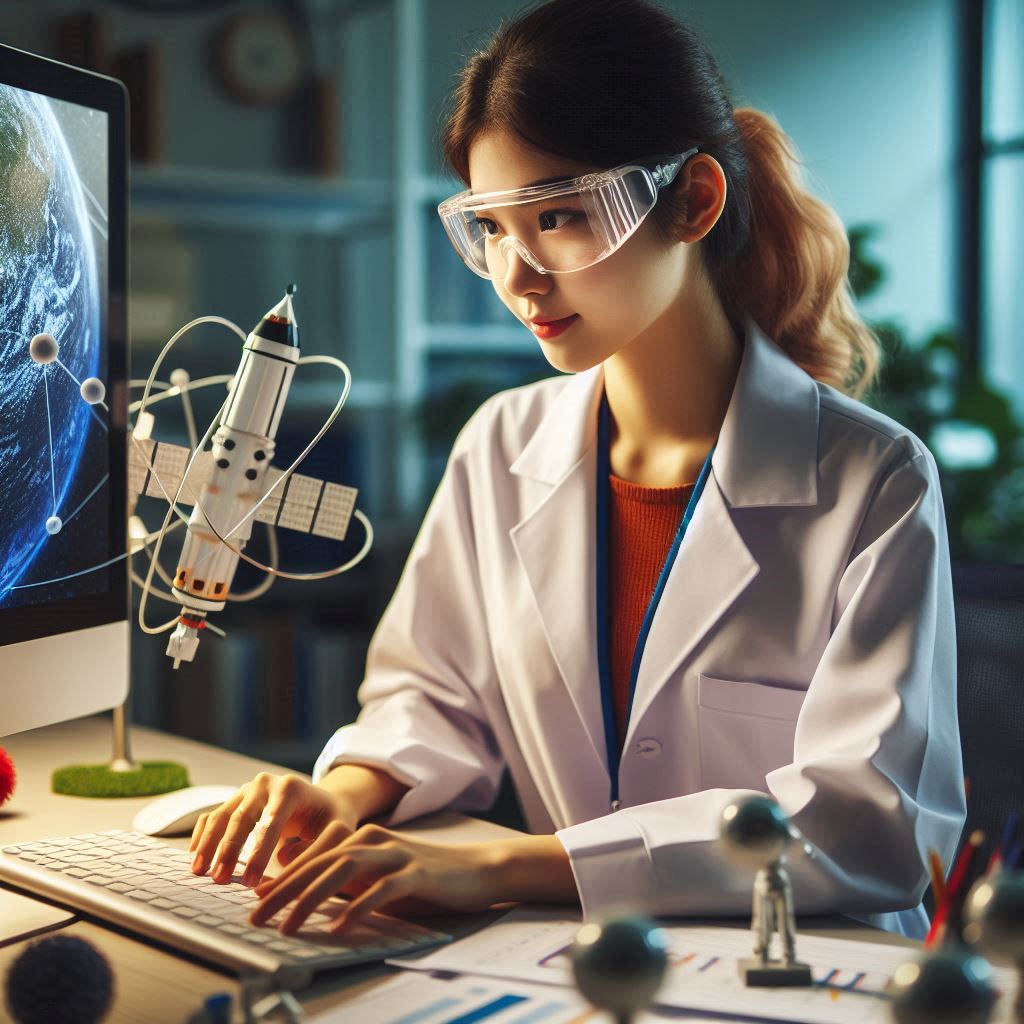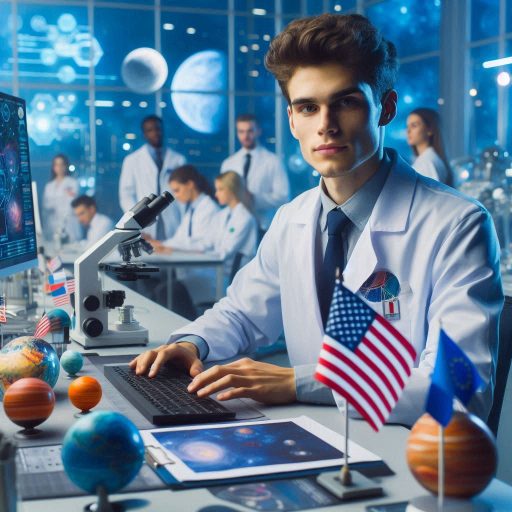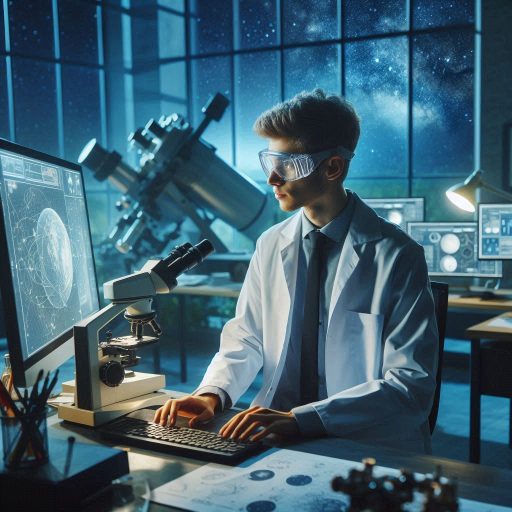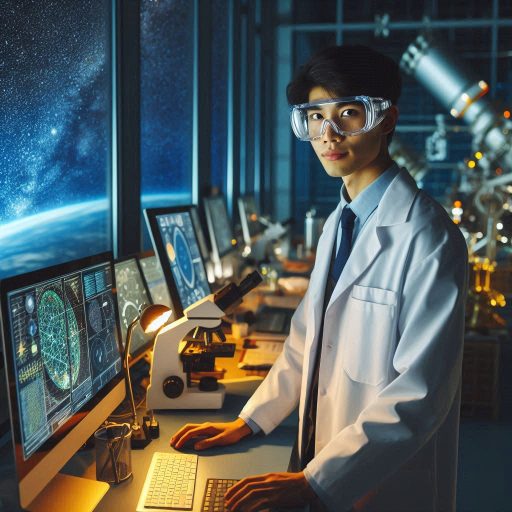Introduction
Space science is the study of celestial phenomena and the universe’s mysteries.
This field encompasses astronomy, astrophysics, planetary science, and more.
Understanding space science is crucial for modern society as it drives technological advancements and enhances our knowledge of the universe.
The field of space science is rapidly expanding due to technological innovations and increased interest in exploration.
As space agencies and private companies invest in missions, competition for jobs grows.
This surge in interest attracts many aspiring scientists, making it essential for candidates to distinguish themselves.
Acquiring specific skills is vital for success in a space science career.
Strong analytical skills enable scientists to interpret complex data from missions and experiments.
Proficiency in programming languages, such as Python or MATLAB, is increasingly important for data analysis and simulation tasks.
Additionally, problem-solving abilities help scientists tackle challenges that arise during research and experimentation.
Effective communication skills are also crucial.
Space scientists must convey complex ideas to diverse audiences, including policymakers and the public.
Space science plays a vital role in our understanding of the universe.
As the field grows more competitive, acquiring the right skills becomes essential for aspiring professionals seeking successful careers in space science.
Strong Math and Physics Skills
Importance of a Solid Foundation in Mathematics and Physics
Having a strong foundation in mathematics and physics is crucial for space scientists.
These subjects enable scientists to grasp the fundamental principles governing the universe.
Understanding these principles helps in analyzing data, modeling phenomena, and predicting outcomes.
Mathematics equips scientists with the tools needed for calculations and problem-solving.
Physics provides insights into the laws governing motion, energy, and forces.
Together, they form the basis for interpreting observations in space science.
Mathematical and Physical Principles Commonly Used in Space Research
Several mathematical and physical principles are commonly employed in space research and exploration.
For instance, calculus is essential for understanding changes in motion and analyzing trajectories.
Differential equations help model complex systems and predict their behavior over time.
Another important principle is Newton’s laws of motion.
These laws describe how objects move and interact under various forces.
Understanding gravitational forces is vital for tasks like launching spacecraft and maneuvering satellites.
Additionally, concepts from thermodynamics are crucial in space science.
They help scientists understand energy transfer and heat management in space environments.
These principles are vital when designing instruments and spacecraft that operate in extreme conditions.
Real-World Applications of Math and Physics Skills
Space scientists apply their math and physics skills in various real-world projects.
For example, when launching a satellite, scientists use calculus to calculate the required thrust and trajectory.
They analyze data to ensure the satellite reaches its intended orbit.
In studying planetary atmospheres, scientists apply principles of thermodynamics and fluid dynamics.
These principles help model atmospheric behavior and predict weather patterns on other planets.
Accurate models are essential for mission planning and understanding environmental conditions.
Space telescopes like Hubble also rely on mathematical precision.
Scientists use optics and wave equations to design instruments that capture clear images of distant celestial objects.
This application of physics is crucial for expanding our knowledge of the universe.
Furthermore, data analysis plays a significant role in space missions.
Scientists utilize statistical methods to interpret data from instruments.
For example, they analyze the frequency of seismic waves to assess geological activity on other planets.
In robotic missions, physics helps scientists understand how to navigate and control spacecraft.
By applying principles of kinematics, they can program robots to perform complex tasks on other planets.
This application is crucial for gathering data and conducting experiments remotely.
A successful career in space science demands a solid foundation in mathematics and physics.
These subjects provide the tools needed to understand complex concepts and solve real-world problems.
Mathematical principles like calculus and physical principles like Newton’s laws are integral to space research.
Space scientists apply these skills in various projects, from launching satellites to analyzing planetary atmospheres.
Mastering math and physics not only enhances problem-solving abilities but also drives innovation in space exploration.
With these skills, aspiring space scientists can significantly contribute to our understanding of the universe.
Read: Women in Botany: Celebrating Pioneers and Leaders
Research and Analytical Skills
The Need for Strong Research and Analytical Skills
Space scientists collect and interpret vast amounts of data from various sources.
Strong research skills enable them to design experiments and gather relevant information.
They often rely on literature reviews to understand existing studies and findings.
Analytical skills are crucial for evaluating data quality and reliability.
Space scientists analyze data from telescopes, satellites, and other instruments.
They must be proficient in statistical methods to draw meaningful conclusions.
Furthermore, space scientists utilize software tools for data analysis.
Programs like MATLAB, Python, and R help them process and visualize complex datasets.
Mastery of these tools enhances their ability to interpret results effectively.
Fieldwork also plays a significant role in data collection.
Space scientists may conduct experiments in laboratories or remote locations.
They gather samples, make observations, and record measurements to support their research.
Importance of Critical Thinking and Problem-Solving Abilities
Critical thinking is essential for addressing complex space-related challenges.
Space scientists must evaluate hypotheses and consider multiple perspectives.
They analyze problems and identify potential solutions based on scientific principles.
Problem-solving skills allow space scientists to tackle unexpected obstacles.
Projects often encounter unforeseen technical or logistical issues.
Being adaptable and resourceful is crucial in these situations.
For example, when a satellite experiences a malfunction, scientists must quickly diagnose the problem.
They analyze the available data and develop a plan for resolution.
This process requires both critical thinking and collaboration with engineers.
Moreover, space scientists often engage in interdisciplinary research.
They collaborate with experts from various fields, such as engineering and computer science.
This collaboration fosters creative solutions to complex challenges.
Examples of Research Methodologies and Analytical Tools
Space science research employs various methodologies and analytical tools.
Observational studies play a significant role in collecting data.
Scientists observe celestial events, phenomena, and environmental conditions to gather insights.
Experimental methods are also common in space science.
These involve controlled experiments designed to test specific hypotheses.
For example, scientists may simulate space environments in laboratories to study material behavior.
Additionally, modeling and simulation techniques are vital for understanding complex systems.
Scientists use mathematical models to predict celestial phenomena and explore theoretical scenarios.
Software like STK (Systems Tool Kit) and GIS (Geographic Information Systems) assists in these analyses.
Remote sensing technology is another critical tool.
Space scientists analyze data from satellites to study Earth’s atmosphere and surface.
This technology provides valuable insights into climate change and natural disasters.
A successful career in space science demands strong research and analytical skills.
Critical thinking and problem-solving abilities are equally important for navigating complex challenges.
Familiarity with various research methodologies and analytical tools enhances scientists’ effectiveness in their roles.
As space science continues to evolve, professionals must remain adaptable and open to learning.
By developing these essential skills, aspiring space scientists can make meaningful contributions to our understanding of the universe.
Their work plays a vital role in advancing space exploration and addressing the pressing challenges of our time.
Read: How Climate Change Is Impacting Plant Research
Technical Skills
The Significance of Technical Skills
Technical skills form the backbone of many space science careers.
Programming languages like Python, C++, and MATLAB are foundational for data analysis and simulation.
These languages enable scientists to write algorithms, process large datasets, and create visualizations.
Engineering skills are equally vital.
Space scientists often work on designing and constructing spacecraft and instruments.
Understanding engineering principles allows scientists to contribute effectively to projects and teams.
Computer modeling is another critical area.
It helps scientists simulate complex systems, like rocket launches or planetary atmospheres.
Creating accurate models provides insights that drive decision-making in space missions.
Additionally, technical skills enhance collaboration among interdisciplinary teams.
Space science projects often involve physicists, engineers, and mathematicians.
A shared technical language fosters effective communication and teamwork.
Technology’s Role in Advancing Space Exploration
Technology plays a transformative role in advancing space exploration.
It enables scientists to design, build, and operate sophisticated spacecraft and instruments.
Technical skills are essential for leveraging these technologies effectively.
Advancements in technology, such as artificial intelligence and machine learning, are revolutionizing space research.
Scientists use AI to analyze data from telescopes and satellites, leading to new discoveries.
Machine learning algorithms help identify patterns in vast datasets that would be difficult to process manually.
Moreover, technology enhances mission planning and execution.
Engineers and scientists use simulation software to model various scenarios.
This process allows teams to anticipate challenges and develop effective solutions before launching missions.
Common Software Programs and Technical Tools
Numerous software programs and technical tools are commonly used in space science projects.
For data analysis, scientists frequently use MATLAB and R.
These tools facilitate statistical analysis, data visualization, and modeling.
Computer-aided design (CAD) software is essential for engineering spacecraft.
Programs like SolidWorks and AutoCAD allow engineers to create detailed designs and specifications.
These tools help ensure that all components fit together seamlessly.
Moreover, mission planning tools, such as NASA’s GMAT (General Mission Analysis Tool), assist in trajectory calculations.
These programs help scientists determine the best paths for spacecraft during missions.
Additionally, programming environments like Jupyter Notebooks are popular for coding and data analysis.
They allow scientists to document their work while developing algorithms and visualizations.
In essence, technical skills are paramount for a successful career in space science.
Programming, engineering, and computer modeling form the foundation for this dynamic field.
Technology continues to revolutionize space exploration, making these skills even more essential.
Proficiency in software programs and technical tools enhances a scientist’s ability to contribute effectively.
Aspiring space scientists should focus on developing these skills to succeed in their careers.
By doing so, they will be well-equipped to tackle the challenges and opportunities that lie ahead in the exciting world of space science.
Read: Exploring the Different Branches of Geology

Communication and Collaboration
Importance of Effective Communication Skills in Space Science Projects
Effective communication is vital when working with interdisciplinary teams in space science.
These projects often involve professionals from various fields, including physics, engineering, and computer science.
Each discipline has its own jargon and methodologies, making clear communication crucial.
When scientists communicate effectively, they foster collaboration and minimize misunderstandings.
This clarity helps team members align their goals and expectations.
Good communication also encourages a positive working environment, enhancing team cohesion.
Moreover, effective communication ensures that all team members understand their roles and responsibilities.
When everyone is on the same page, projects progress smoothly and efficiently.
This coordination ultimately leads to more successful outcomes.
Need for Clear and Concise Communication
Space science often involves complex ideas and results that can be difficult to convey.
Clear and concise communication is necessary to ensure understanding among colleagues and stakeholders.
Scientists must break down intricate concepts into easily digestible information.
Using simple language helps bridge gaps between specialists and non-specialists.
This approach ensures that all team members grasp essential ideas, regardless of their expertise.
Clear communication also benefits discussions with stakeholders and funding agencies.
When presenting findings to the general public, scientists must further simplify their language.
Engaging storytelling can help make complex topics accessible.
This ability to connect with a wider audience is essential for garnering support for research initiatives.
Successful Collaborations and the Role of Communication
Many successful collaborations in space science highlight the importance of effective communication.
One notable example is the Mars Rover missions, which involve extensive collaboration among various organizations.
NASA, universities, and private companies work together, sharing data and insights to achieve common goals.
In these collaborations, regular communication channels facilitate information sharing.
Team meetings, progress reports, and updates ensure that everyone stays informed.
This ongoing dialogue fosters trust and accountability among team members.
Another example is the International Space Station (ISS) program.
Multiple space agencies collaborate on research and experiments aboard the ISS.
Clear communication among international partners is crucial for coordinating efforts and sharing scientific knowledge.
These examples illustrate that successful collaborations hinge on effective communication.
When team members share ideas and insights openly, they foster innovation and problem-solving.
This collaboration leads to groundbreaking discoveries and advancements in space science.
Effective communication skills are essential for a successful career in space science.
These skills enable scientists to collaborate effectively within interdisciplinary teams.
Clear and concise communication helps convey complex ideas to colleagues, stakeholders, and the public.
Successful collaborations, like those in the Mars Rover missions and the ISS program, highlight the vital role of communication in achieving scientific goals.
By prioritizing communication, space scientists can enhance collaboration and drive innovation in their field.
Read: Top Skills Needed for a Successful Geology Career
Adaptability and Problem-Solving
Importance of Adaptability and Problem-Solving Skills
Space scientists operate in environments that are often unpredictable.
Their work involves extensive research, complex data analysis, and collaboration with various teams.
Adaptability allows them to respond effectively to unforeseen circumstances.
When plans change, scientists must adjust quickly to new situations.
Problem-solving skills are equally vital.
Space scientists face obstacles that may arise unexpectedly during missions.
Whether dealing with equipment malfunctions or unanticipated data anomalies, they must find solutions swiftly.
Their ability to think critically enables them to evaluate situations and determine the best course of action.
In the field of space science, adaptability ensures scientists remain effective.
When launching rockets, scientists must adjust to weather conditions and technical issues.
Rapid decision-making can make the difference between mission success and failure.
Adaptability fosters resilience in the face of challenges.
Encountering Unexpected Challenges and Obstacles
Space science research often presents unique challenges.
For instance, spacecraft may encounter unpredicted issues during missions.
Sensors might malfunction, or communication systems could fail.
Scientists must remain calm and focused under pressure.
When unexpected challenges arise, quick thinking becomes essential.
Space scientists often rely on their training and experience to assess situations.
They analyze data to identify the root cause of problems and propose solutions.
This requires a blend of analytical thinking and creativity.
One example involves the Mars rover missions.
Engineers faced numerous challenges, such as dust accumulation on solar panels.
To address this, they developed innovative cleaning techniques.
This adaptability ensured the rover could continue to operate effectively.
Problem-Solving Strategies and Adaptive Behaviors
Effective problem-solving strategies are critical in space science.
Scientists often use systematic approaches to tackle challenges.
They may employ root cause analysis to identify underlying issues.
This method helps them develop targeted solutions.
Collaboration is another vital strategy.
Space scientists frequently work in teams, pooling their expertise.
They brainstorm ideas and evaluate multiple perspectives on problems.
This collaborative environment fosters creativity and encourages innovative solutions.
Moreover, space scientists often conduct simulations to prepare for potential issues.
These simulations allow them to practice responses to various scenarios.
By anticipating challenges, they enhance their adaptability during real missions.
Finally, maintaining a growth mindset is essential.
Space scientists embrace learning from failures and setbacks.
Each obstacle provides an opportunity to refine skills and approaches.
This mindset fosters resilience and promotes continuous improvement.
Adaptability and problem-solving skills are critical for success in space science.
Scientists must navigate unexpected challenges and obstacles with agility.
By employing effective problem-solving strategies and adaptive behaviors, they enhance mission success.
These skills enable them to thrive in the fast-paced environment of space exploration.
Ultimately, adaptability and problem-solving shape the future of space science and drive innovation in the field.
Transform Your Career Today
Unlock a personalized career strategy that drives real results. Get tailored advice and a roadmap designed just for you.
Start NowAttention to Detail and Precision
Importance of Attention to Detail and Precision
Attention to detail is crucial in space science.
It ensures that scientists gather and analyze data accurately.
A small oversight can lead to incorrect conclusions and flawed research outcomes.
Precision in measurements, calculations, and observations is essential in this field.
When conducting experiments or analyzing data, scientists must remain vigilant.
Even the slightest deviation from established protocols can compromise results.
Rigorous adherence to methods and standards is necessary for maintaining data integrity.
In space missions, attention to detail becomes even more critical.
Scientists design complex instruments and systems that must function flawlessly.
Ensuring that every component meets precise specifications is vital for mission success.
Moreover, space scientists often work with massive datasets.
Analyzing this information requires meticulous attention to detail.
Scientists must identify patterns and anomalies that can impact research findings.
Inaccuracies in data analysis can hinder progress and result in wasted resources.
Consequences of Small Errors or Inaccuracies
Small errors in space science can have significant consequences.
For example, a minor miscalculation in trajectory can lead to mission failure.
If a spacecraft deviates from its intended path, it may miss its target.
Such errors can result in costly delays and the loss of valuable scientific data.
In research findings, inaccuracies can mislead scientists and policymakers.
Incorrect data interpretation can shape future studies and funding decisions.
Addressing false conclusions can require extensive additional research to correct the record.
Moreover, the stakes are high in human spaceflight missions.
Precision is paramount when developing life support systems and spacecraft designs.
Any failure in these systems can jeopardize astronaut safety and mission objectives.
History provides several examples of how small mistakes have impacted missions.
The Mars Climate Orbiter famously disintegrated due to a unit conversion error.
The oversight resulted from a failure to account for differences in measurement units.
This incident highlights how critical attention to detail is in space science.
Examples of Successful Space Science Projects
Attention to detail and precision have contributed to many successful space science projects.
NASA’s Hubble Space Telescope relies on meticulous engineering and calibration.
Its precise instruments have provided stunning images and invaluable data about our universe.
Another example is the Voyager spacecraft.
Voyager 1 and 2 successfully traveled beyond our solar system.
Precise calculations allowed scientists to navigate these spacecraft accurately to gather critical data on planetary systems.
The Mars Rover missions exemplify the importance of detail in operational success.
Engineers and scientists meticulously design, test, and calibrate each rover’s components.
These efforts ensure that rovers can withstand harsh Martian environments and conduct scientific investigations.
Attention to detail and precision are indispensable skills in space science.
They ensure accurate data collection and analysis, preventing costly errors.
Small inaccuracies can lead to significant consequences in missions and research findings.
Successful projects like Hubble, Voyager, and Mars Rovers demonstrate the impact of meticulous work.
As aspiring space scientists hone these skills, they will contribute to the advancement of knowledge in the field.
Embracing attention to detail will help ensure the success of future space missions and research endeavors.
Conclusion
A successful career in space science requires a diverse set of skills.
Strong math and physics skills form the foundation for understanding complex concepts.
Research and analytical skills help scientists interpret data and draw meaningful conclusions.
Technical skills are vital for using advanced equipment and software in research.
Familiarity with programming languages can enhance data analysis capabilities.
Communication and collaboration skills are also crucial, as space scientists often work in teams.
Adaptability and problem-solving abilities are essential in this ever-evolving field.
Scientists must navigate unexpected challenges and develop innovative solutions.
Attention to detail and precision are critical when conducting experiments or analyzing data.
Small errors can lead to significant inaccuracies in results.
Space science is inherently interdisciplinary, combining elements from various fields, including engineering, biology, and geology.
This collaborative nature fosters a rich learning environment and encourages diverse perspectives.
Aspiring space scientists should actively develop and hone these skills.
Engaging in hands-on projects, internships, and workshops can provide valuable experience.
By pursuing opportunities to enhance their skill set, students can prepare for a rewarding career in space science.
A commitment to lifelong learning and skill development will lead to impactful contributions in this exciting field.




